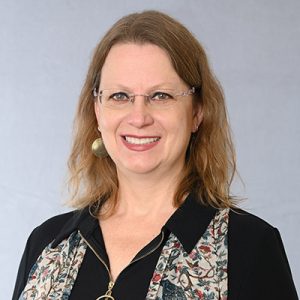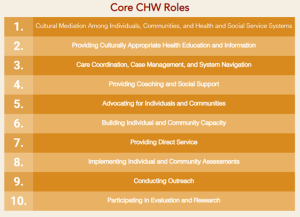Dr. Kerstin Reinschmidt and an Oklahoma University Health Sciences Center (OUHSC) team created, Implementing the C3 Scope of Work in CHW Training Programs: An Innovative Dementia Training for CHWs with funding from HRSA. Tribal community health staff (and others) were tapped for feedback on the design and development of the training and have been active participants in the train-the-trainer program.
Kerstin M Reinschmidt, Ph.D., MPH, is the Co-Director of the OUHSC Qualitative Methods Community of Practice (QMCOP) and an Associate Professor in the Department  of Health Promotion Science at the Hudson College of Public Health at The University of Oklahoma. Dr. Reinschmidt also works with the OkDCN (Oklahoma Dementia Care Network) at Oklahoma University Health Sciences OUHSC. Implementing the C3 Scope of Work in CHW Training Programs: An Innovative Dementia Training for CHWs was funded through the Geriatric Workforce Enhancement Program (GWEP) by HRSA in 2019.
of Health Promotion Science at the Hudson College of Public Health at The University of Oklahoma. Dr. Reinschmidt also works with the OkDCN (Oklahoma Dementia Care Network) at Oklahoma University Health Sciences OUHSC. Implementing the C3 Scope of Work in CHW Training Programs: An Innovative Dementia Training for CHWs was funded through the Geriatric Workforce Enhancement Program (GWEP) by HRSA in 2019.
As a key leader for the project, Dr. Reinschmidt and the team have been working with a community advisory board. This advisory board consists of 25 organizations and meets quarterly. The overall aim is to address the unmet health needs of the people of Oklahoma with dementia and their caregivers.
OkDCN provides health and public health workforce education and training to maximize patient and family caregiver engagement to improve health outcomes. This training reaches beyond just public health workers and provides training to nurses, physicians, nursing homes, and more. Dementia care, dementia prevention, and dementia management are all training topics.
By training the workforce, the goal is to train the people on the ground, who can, in turn, help their communities and those around them.
In the first year, the team spent time developing the pieces of training and building partnerships. Partners include the Choctaw Nation (the main tribal partner), Citizen Potawatomi Nation, Indian Health Services (IHS), and the local health department as a nontribal partner. The training was developed by a group that came together to form the Community Health Worker and Community Health Representatives (CHW/CHR) workgroup. The workgroup met monthly to develop the training.
The first step was to ask:
- What is your experience with dementia?
- What do you encounter in your organization?
- Do you have materials?
- Do you have ways of addressing the current needs within your community regarding ADRD?
- What are you currently doing to address ADRD?
Then:
- What training do you need from us to help your CHRs/CHWs address the needs within your community?
The team then began work on the straining structure and content. Workgroup participants shared their personal and organizational experiences to help shape the training. The training content is based on a suite of evidence-based materials. Most source materials came from the Alzheimer’s Association but also included materials from CDC, the Road Map for Indian Country, and materials from HRSA.
In addition, the team used C3 CHW Core Roles, which provides evidence-based materials and presentations while respecting diverse communities. The team developed 10 Core Roles and 11 core skills. The Core Roles were used to create a significant part of the training, including the training qualities and competencies. Training that was accessible to all communities was a priority during development. 
The training has multiple parts. The first is the train-the-trainer portion. This part of the training works directly with CHW/CHRs and is focused on a basic curriculum. The curriculum includes:
- Introduction to the training
- Basics of dementia
- Knowledge and understanding of the Core Roles and Cores Skills
- A Resource Guide,
- Time to explain how to implement the training and the technical aspects
The train-the-trainer portion was implemented by five key trainers. Once the CHW/CHRs complete this part of the training, they are considered trainers within their community.
The second part allows the CHW/CHRs to take the knowledge and skills they have gained to implement the basic training in the community. The idea is to create a ripple effect of knowledge sharing and increase the reach of education regarding dementia in communities and tribes.
One of many long-term goals is to eventually create a dementia certificate that trainers can receive once they complete the training.
Over the last two years, 77 CHWs/ CHRS participated in the training. Because of COVID, the trainings were all completed on Zoom, though the original design was for in-person training.
Even with virtual training, the team knew that creating the sense of a group setting on Zoom was essential. Specific attention to creating a collaborative setting allowed tribes and organizations to learn from each other and network amongst the group. During the training, participants were allowed the time to share their personal experiences. Participants could relate and connect through the stories shared by the CHW/CHRs. The personal experiences of dementia in their own families and communities created relationships and opened up conversations for participants. While creating a group setting was a priority, the relationship building and personal connections turned out to be positive unintended impacts that strengthened the training.
Training evaluation showed that the participants’ knowledge increased and that participants were able to identify helpful resources. The evaluations also found that participants felt the train-the-trainer model was a success. A strong overall theme in evaluation results was the desire for in-person training (versus recorded or static training).
Partners include the Choctaw Nation (the main tribal partner), Citizen Potawatomi Nation, Indian Health Services (IHS), and the local health department as a nontribal partner.
Training that was accessible to all communities was a priority during development.
While creating a group setting was a priority, the relationship building and personal connections turned out to be positive unintended impacts that strengthened the training.
